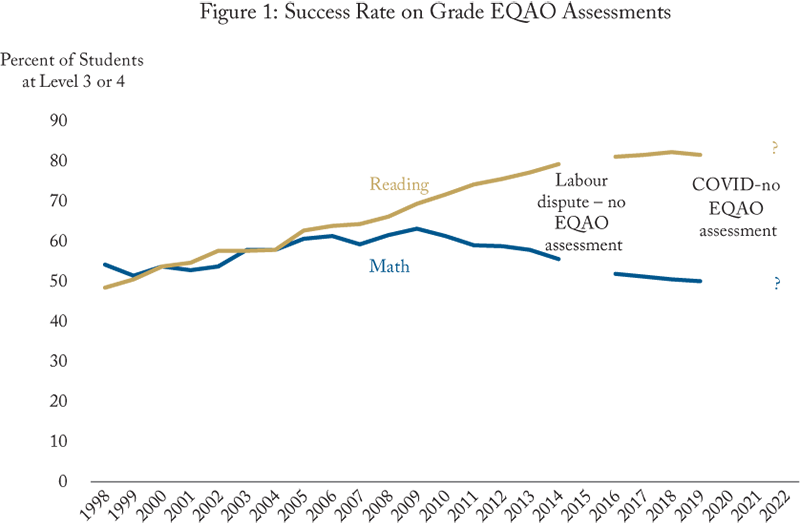From: David R. Johnson
To: Ontarians Concerned About Education
Date: May 18, 2022
Re: What Education-Testing Chant Should We Choose in 2022?
Two chants are on offer:
"Hey Ho, Hey Ho, the EQAO must GO!"
"Hey Hey, Hey Hey, the EQAO must STAY!"
These chants summarize opposing views in the Ontario election campaign. The Liberal and the New Democrats promise to abandon the elementary school assessment system as currently operated by the Education Quality and Accountability Office (EQAO). There is no sign a Conservative government would end EQAO testing.
What would be best for knowing how students are doing? There are strong arguments to retain EQAO assessments as they are currently formulated and no convincing arguments for their removal.
The EQAO provincial assessments of literacy and numeracy have been given to every student at the end of Grade 3 and the end of Grade 6 since 1996. Parents and teachers receive individual student results in the fall following the assessment in the spring. Results averaged across students by school are made public at the same time. After a COVID-driven pause for the last two years, assessments are currently underway across the province.
What is the purpose of EQAO? EQAO is an independent agency of the Ontario government, led by a Chief Executive Officer and governed by a board of directors. Its mandate is to support and guide student improvement by providing credible information about the quality of the province's publicly funded elementary and secondary education system. This is a good thing.

Figure 1 presents valuable and credible information. It shows that reading capabilities at the end of Grade 6, measured in a similar way over time on a similar assessment have increased since the 1990s. Figure 1 also shows that mathematics capabilities at the end of Grade 6, measured in a similar way, peaked in 2008-09 and have been on a steady decline since.
This information would not be available in a timely fashion without the EQAO assessment. This information tells educators, parents, and administrators of success in the teaching of reading and problems in the teaching of math. The most important values on Figure 1 is denoted with a large question mark. How will students perform on the assessments currently being written?
When these results are in, then we will have a provincial-level, a school-level and for the students in the assessment, an independent and credible individual level measure of the effects of the pandemic school disruptions on student achievement relative to non-pandemic years. If we have no idea how the pandemic affected learning on an equivalent scale, how can we begin to create corrective policies?
There is strong evidence that teacher report cards are not a completely credible measure of student ability in the pandemic. The Toronto District School Board (TDSB) did assessments of Grade 1 reading, something quite similar to the EQAO process.
The results showed 10 percentage points fewer students met grade level expectations in January 2021 than in January 2019 presumably because of pandemic-related interruptions. Given the amount of school missed in 2020 and 2021 this seems likely to be true. However, teacher report cards at the TDSB showed a three-percentage point increase in the percentage of students meeting Grade1 reading expectations between January 2019 and January 2021. The TDSB concluded this difference requires a more in-depth analysis.
A reasonable person might conclude that this discrepancy begs for an external assessment process in all schools for all students, the exact process provided by the EQAO.
Teacher report cards are not enough to measure student progress. In this example the outside assessment of reading skills of Grade 1 students showed a substantial decline in skills and the report card assessments showed a small increase. Common sense suggests that, given the disruptions to schooling, it is unlikely reading skills increased. An external assessment would help teachers, parents and school administrators.
As a universal provincial assessment, the EQAO makes this information available without cost to all school boards, not just the TDSB.
An important feature of the EQAO elementary assessment process is the empowerment of parents and principals in any discussion of individual student results. If the teacher report card(s) and the EQAO result of a student or a group of students are systematically different, then the principal or parent can have a discussion about such differences. Otherwise, the teacher report card is the only source of information, and, as noted above, there is evidence that report cards as measures of student progress have serious problems.
The external EQAO assessment plays a vital role at the end of Grade 3 and Grade 6. Clearly, then, the better chant is:
"Hey Hey, Hey Hey, the EQAO must STAY!"
David R. Johnson is professor of economics at Wilfrid Laurier University and a C.D. Howe Institute Research Fellow.
To send a comment or leave feedback, email us at blog@cdhowe.org.
The views expressed here are those of the author. The C.D. Howe Institute does not take corporate positions on policy matters.





